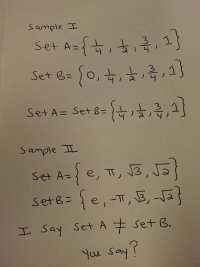You are using an out of date browser. It may not display this or other websites correctly.
You should upgrade or use an alternative browser.
You should upgrade or use an alternative browser.
Two Equal Sets
- Thread starter mathdad
- Start date
Dr.Peterson
Elite Member
- Joined
- Nov 12, 2017
- Messages
- 16,619
One of these is wrong. Which one? Why?
mathdad
Full Member
- Joined
- Apr 24, 2015
- Messages
- 925
I say the first sample is wrong because set A does not include 0, which is needed to be equal to set B.One of these is wrong. Which one? Why?
Dr.Peterson
Elite Member
- Joined
- Nov 12, 2017
- Messages
- 16,619
Correct. Zero is not a non-number, or the lack of a number, that can be ignored.I say the first sample is wrong because set A does not include 0, which is needed to be equal to set B.
mathdad
Full Member
- Joined
- Apr 24, 2015
- Messages
- 925
The Mayans defined zero as the absence of value. Do you agree? Disagree? Why?Correct. Zero is not a non-number, or the lack of a number, that can be ignored.
I think that the discovery of zero was one of the brightest moments in human history (IIRC in India, ~5000 years ago)! Someone decided to give something a name that wasn't there and revolutionized arithmetics!
The less romantic view is that it was probably an accountant who found it convenient to mark a missing number in order to distinguish it from an ordinary empty space in texts.
The less romantic view is that it was probably an accountant who found it convenient to mark a missing number in order to distinguish it from an ordinary empty space in texts.
mathdad
Full Member
- Joined
- Apr 24, 2015
- Messages
- 925
The discovery of the whole number 0 is an Indian contribution. Really? I thought the Mayans were responsible for the definition of zero we know today. No?I think that the discovery of zero was one of the brightest moments in human history (IIRC in India, ~5000 years ago)! Someone decided to give something a name that wasn't there and revolutionized arithmetics!
The less romantic view is that it was probably an accountant who found it convenient to mark a missing number in order to distinguish it from an ordinary empty space in texts.
It's been a long time since I researched it. The Babylonians used a sign for a missing number. But where did they get it from? My approach then was to figure out where the specific signs for numbers came from and I found India as their origin. That doesn't necessarily mean that the Mayas didn't make the discovery, too. However, our current number system (the symbols) took the path: India > Mesopotamia > Arabs > Italy > Europe > rest of the world with sometimes big time gaps. I seriously doubt that there has been any cultural exchange between the Maya and the western ancient world. Even the Spaniards rather destroyed their culture than adopted it. If it was Mayan, then how could we know?
mathdad
Full Member
- Joined
- Apr 24, 2015
- Messages
- 925
Interesting. I concur.It's been a long time since I researched it. The Babylonians used a sign for a missing number. But where did they get it from? My approach then was to figure out where the specific signs for numbers came from and I found India as their origin. That doesn't necessarily mean that the Mayas didn't make the discovery, too. However, our current number system (the symbols) took the path: India > Mesopotamia > Arabs > Italy > Europe > rest of the world with sometimes big time gaps. I seriously doubt that there has been any cultural exchange between the Maya and the western ancient world. Even the Spaniards rather destroyed their culture than adopted it. If it was Mayan, then how could we know?

